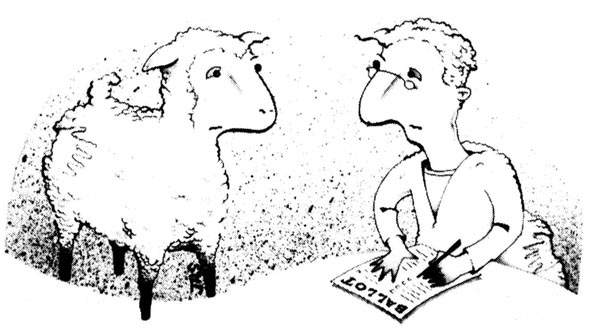|
|||||||||||||
Anarcho-Collectivism versus
Posts #15-#16
Post #15
Greetings, Labor produces all wealth...
The factors of production, i.e., capital and capital goods, are likewise -- nothing more than the products of labor. As far as the ideas and entrepreneurship, those could have just as easily been provided by the workers themselves. This has already been the case for hundreds of years, with worker cooperatives or through Capitalists stealing ideas from their workers (as in the production of the automobile engine, or the steam engine, or the textile industries). Capitalist entrepreneurship provides nothing, and its definition is rooted in owning and possessing. That is to say, when the workers are properly organized, they are just as capable of providing the "skills" of entrepreneurship -- they do not have the economic means of it, though. Essentially, 'being the owner' is not a contribution, and the workers have never had difficulty fulfilling this arduous, unavailing, back-breaking, and blacklung-giving "job." Vanderbilt...
[...]
The definition of a cartel is a group of industrialists that work together in order to control markets by their collusion. It does not begin and end at the moment that someone declares it to be so. It is a cartel, by the acts of its members, and not by what they call it, or whatever historian wants to revise it as. I had provided a reference earlier for this. [*1] Let me provide another historian, "'Wherever his keen eye detected a line that was making a large profit... he swooped down and drove it to the wall, by offering a better service and lower rates' -- for a time. Then with the opposition driven out, he would raise his rates without pity, to the lasting misery of his clients." [*2] Another history book gives an accurate description of Vanderbilt's model, "...compete fiercely by means of price until the opposition is either broke and can be bought out or pays you to stop competing..." [*3] Did Vanderbilt have a cartel? Maybe not. But with the other industrialists, he fixed prices on the market. This is monopoly -- when a market is controlled by a very few interests, and everyone else are its subjects. BitTorrent...
That's a quantum leap in deductive reasoning. A black market exists for a product, therefore, price-fixing and collusion among the legal industry is "unsuccessful"? Of course -- the illegal drug market definitely proves that the price-fixing and monopoly of legal healthcare is also amazingly unsuccessful, right? Black markets exist for food, cigarettes, even money. I suppose all monopoly is unsuccessful, and there's no point in even worrying about it. Concentration of Wealth into the Hands of a Few...
[...]
We both agree that Capitalists, property owners, and other privileged classes of society have used the state to advance its own interests. However, only over the past two hundred years has the means of production changed from the hands of many to an isolated few. It was the introduction of machinery that changed these relationships. Landowners have ranged from industrialists and landlords to poor, destitute farmers. It was not the state, but the evolution of the means of production, that determined the relationship between the workers and the tools that they use. State aggression has existed since the dawn of civilization, but the majority of society being employed by a few is a very new fact. Tracing the history of industrialism, however, explains the class division much more logically. Workers' Emancipation...
You have no problem with Capitalism? Do you not see, though, that it is at least undesirable by the vast majority? That is to say, the interests of the Capitalists are directly opposed to the interests of the workers. In the words of Marx, "The share of (profit) increases in the same proportion in which the share of labor (wages) falls, and vice versa. Profit rises in the same degree in which wages fall; it falls in the same degree in which wages rise." [*4] This is not a moral statement about exploitation. It's a very lucid and simple explanation of the economic facts, as far as they concern the majority of people in the economy. In the US, there are 6 million businesses, [*5] but 155 million workers. [*6] And the interests of small businesses are just as opposed to their workers as big businesses. Is it not at least desirable that Capitalism is abolished? The property owners live by possessing, by trade, by speculation. Wouldn't it increase the wealth of each individual in society, if we were to reclaim those profits? Wouldn't industry be directed towards the good of society, instead of polluting, selling poisoned food, and propping up dictators in third worlds? In the words of Proudhon, to be an employee is to be "subordinated, exploited: his permanent condition is one of obedience." [*7] To be employed means to be splitting part of your wealth with your employer; to be taxed by merchant, middleman, industrialist, and the state for the right to work. All of those parasites must consume as much as possible, otherwise there will be a fall in revenue, and then workers will be laid off, and then less consumption, and then even more layoffs. The economic fluctuation has produced a permanent army of the unemployed; and they are not unemployed because there is not labor to be done, or value to be created and exchanged. It is because the land and the machinery are in the hands of a few; and so long as this fact persists, so long as the productive means of production are in the hands of the few, it will always be directed towards the interests of the few. And likewise, in all spheres of economic life of the worker. Factories should be well-ventilated, clean, supplied with safe machinery, and with an efficiently organized means of production; but all of these things are rejected or compromised because of Capitalist' interest in profit. Low-quality, expensive and unhealthy foods await the consumer at the market; streams and rivers that once belonged to communities are sacrificed to the pollutant greed of an industrialist; and always, the depressions and recessions that arise when the wealthy, masters of all things, decide to consume and invest less. There is everything wrong with this system. And it is in the best interest of every individual, except those of the wealthy Capitalist class, to abolish it. Essentially, to create a society where individuals can exchange with each other on equal, economic footing. It is when the majority of people must beg for the right to work the land that exploitation and poverty become common. Such a misery can only be ameliorated by giving each the means of production, to make worker and capitalist one -- and to destroy the social ills that arise from the conflict of these two interests, without sacrificing the gains of the Industrial Revolution. In the words of the Anarchist James Guillaume...
I've brought up the example of blacklisting multiple times, but you never want to look at it in the face. All of the businesses get together, and refuse to hire a particular worker, because of their social, political, or cultural ideas. Yes, free in every sense, that you are free to starve; the phrase "give me liberty or give me death" isn't providing two options, but really just gives two names for the same thing. Hence, I use the phrase economic authority to distinguish from political authority. One prohibits the individual from working the land, the other imprisons the individual; in both cases, the person ends up either dead or in absolutely miserable conditions. Thank you, Andy Carloff, Resources *1. "Wall Street: A History : From Its Beginnings to the Yall of Enron," by Charles R. Geisst, 2004, First Edition, page 77.
Post #16
Punkerslut: Punkerslut: Time and land (natural resources) are not products of labor. I'm glad you agree that capital and capital goods are legitimate factors of production (theoretically reducible to labor.) Maybe you will now stop advocating exploiting holders of capital by stealing their product and giving it to shorter-term and/or manual laborers.
Yes, and in the particular cases where a worker has engaged in successful entrepreneurship, he like anyone else is entitled to its profits.
This is just classist dogma, like saying that black entrepreneurship provides nothing. If you agree that entrepreneurship is a factor of production, it is true for Abe, Bob, Cathy, and anyone else, regardless of any artificial class you might put them in.
I agree. Workers, capitalists, blacks, whites, and most intelligent people are capable of entrepreneurship.
I don't buy a word of that. My information says the opposite - that the 'lower rates and drive them all out' tactic rarely if ever worked. E.g. Quote from: The Myth of the Robber Barons, pg. 4...
Yes, when only a few fools buy at the "fixed" price, while most people get it for free or near-free, I'd say the cartel is remarkably unsuccessful. Fortunately, this black market is even easier to utilize than the one for pot.
No, the price of illegal drugs is generally many times the price it would be in a free market. The price of music OTOH is free or nearly free. This shows that the fascist cartelization of drugs is successful (from the fascist perspective) while the attempted cartel on music CD's is not. A cartel is successful if it raises the price of its product above the free market price.
I agree. But it was the State that provided the aggression which enabled some firms to become much larger than they would have been in a free market. I want the optimum size of firm for producing the needs and wants of man. I don't want the State to favor some firms and entire industries impoverishing mankind to favor cronies. I see most big corporations as big as they are only due to State patronage. In a free society there would still be some big firms, but only when justified by efficiency due to economy of scale.
No, I don't, but this is probably a semantic issue rather than a disagreement between us. I define "capitalism" as an economic system characterized by mainly private ownership of the means of production. Anarcho-capitalism is the voluntary version of capitalism, as opposed to State capitalism (aka fascism) when the State controls (regulates) the means of production. When you use "capitalism," you apparently define it as necessarily involving exploitation and collusion with the State. IOW you are looking only at the statist type. This is the same mistake that some people use with "socialism" - defining it as only the statist version (USSR, N. Korea, etc.) Obviously both socialism and capitalism have a libertarian interpretation. Many things you say I agree with, but only after "translating" from your "capitalism" to "statist capitalism."
No, I don't think that e.g. capitalist Steve Wozniak, with his capital pilfered from Hewlett-Packard, had interests directly opposed to workers. On the contrary, he was a great benefactor to workers with his invention. I don't think everyone with a computer, or a lawn mower, or a wrench is evil or exploitative simply due to their possession of capital. I think your class analysis is useless if not downright perverse. Getting people to hate those with tools (capital goods) is not helpful. I prefer to examine conduct rather than membership is elusive classes. Any point that can be legitimately made using class analysis can be made better using ethics (in particular non-aggression) as the root idea. But again, maybe this is mainly semantics. If I replace your "the Capitalists" with, say, "political entrepreneurs" then I agree - political entrepreneurs are directly opposed to the interests of (most) workers. By using "capitalists," you paint with too broad a brush, including productive talented people in your bad-guy class. That's why, if I use class analysis at all, I use "producers" and "parasites" (or in some contexts "net-tax-payers" vs. "net-tax-consumers.")
Of course, Marx was totally wrong about this. He suffers from the Zero Sum Game fallacy. Successful firms generally have both increasing profits and increasing wages. Unsuccessful firms suffer from falling profits and often wages, too.
This ignores the critical criteria - whether it's voluntary. If one voluntarily agrees to trade labor time for cash, then there is no "tax" about it. If one agrees to buy something, again there is no tax. Generally, out of the four (merchant, middleman, industrialist, and the state) only the last uses aggression, i.e. taxes. Not that employment is so great - in a freed market there would be much more individual entrepreneurship, contract self-employment, etc. The State's favoritism for centralized controllable/plunderable bigness favors employment over other types of productive activity.
That's because I consider it a red herring. First of all, there's no aggression involved, so I don't consider it a political or criminal issue. If someone wants to try to deal with only Jones's, or whites, or blacks, or capitalists, or socialists, or Baptists, or vegetarians, that is their right. It is simply exercising freedom of association. Second, private blacklisting doesn't really work very well. In perhaps the most famous case, Hollywood in the 1950s, many/most of the blacklisted screenwriters simply wrote under a different name. To me blacklisting is an insignificant issue. In the info age, with pseudonymity, it is becoming an obsolete issue. But there is a related issue that I am concerned with: government "blacklisting" of people who do not have the government's permission to work in an occupation. Occupational licensure is a significant issue (and BTW one of the factors making health care so expensive.) Carpe Libertatem,
|






